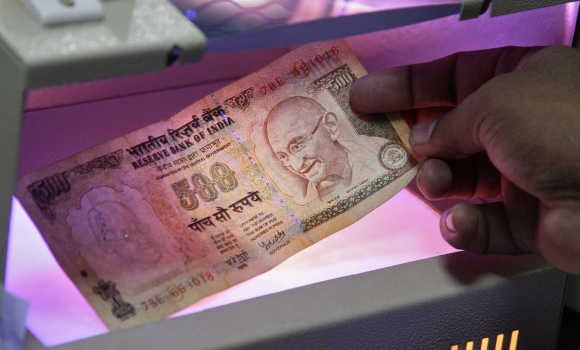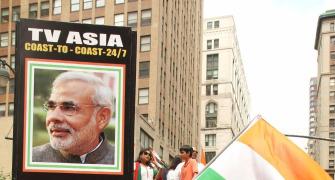 A Fletcher School study shows the cost of cash is higher for the poor than the rich.
A Fletcher School study shows the cost of cash is higher for the poor than the rich.
All the functions that cash performs can be performed digitally via a cellphone or a card, economically and painless.
Over the last decade, while financial inclusion has been an important theme for the government and the regulator, the initiatives that have been taken have been mostly on the supply side.
They have aimed at getting the banks to do more. The attempts have been akin to pushing a rope out harder: the banks have seen "inclusion" as an obligation and done what is required to comply. T
he results have been less than satisfactory.
Even in 2014 more than half of Indian households continue to stay outside the ambit of formal finance.
Two announcements made by the prime minister on Independence Day were important.
The first was a move away from just pushing the rope harder to creating some pull on it, by offering an insurance policy of Rs 1,00,000 to new accountholders.
The second was his focus on digital governance. E-governance, he said would be easy, effective and economical for Indians.
Yet even with the prime minister's announcements, the full scope of what is possible is being missed out.
Is there something more game-changing possible? I believe there is.
Today, the combination of universal and ubiquitous connectivity, enormous computing power, unlimited and cheap storage, and instant information, together with Aadhaar, offers a new paradigm.
What is needed is a move towards abolishing cash.
According to the Reserve Bank of India's data, cash still accounts for 90 per cent of all monetary transactions in India.
Even as growing numbers in cities are using electronic payment systems, such as the National Electronic Funds Transfer (NEFT), these made up a paltry 3.2 per cent of total payments across the country in 2012-13.
In fact, even old-fashioned cheques account for less than 10 per cent of total payments.
A medium-term vision to bring down cash from 90 per cent to even 50 per cent of payments would dramatically spur inclusion.
Abolishing cash would perforce bring about 100 per cent inclusion, make tax evasion very difficult, and reduce the massive transaction costs.
There is a recent study by Bhaskar Chakravorti and Benjamin Mazzotta of the Fletcher School that assesses the cost of cash in the United States - printing, transporting, counting, safe keeping and destroying notes and coins - at $200 billion. Worse, the cost of cash is higher for the poor than the rich.
All the functions that cash performs can be performed digitally via a cellphone or a card, economically and painlessly. What are the challenges?
The most immediate one is ensuring strong and ubiquitous connectivity. But this is in our grasp.
The prime minister talked about using digital education and healthcare, and so providing ubiquitous and universal connectivity is a high government priority.
The second important requirement is a quick spread of point-of-sale machines (POS). These require connectivity and power.
So it is not just the minimal cost of POS machines, but also the requirement of power that constrains us. But again, power reforms are high on the government's agenda.
If the next five years see a meaningful improvement in power and connectivity, then the conditions to remove cash are at hand.
To begin this journey, the biggest spur would be if direct-payment benefits moved directly to the bank accounts of beneficiaries.
As people start to see the convenience of not having to carry cash, this will push the demand for POS machines - and, in fact, much of this could even shift to smartphones.
We must remember that an iPhone has more computing power than the spaceship that took us to the moon in 1969. So the functionality is already available to process these transactions.
Of course, people use cash to avoid paying tax and also to avoid being tracked for a set of activities - from drugs and terrorism to things that they legitimately do not want tracked.
Tax payments go both ways. From a government perspective, this should increase its interest to get away from cash.
For the broader populace, if more people got into the tax net, then we could reduce tax rates and make compliance easier.
Privacy issues are a more legitimate concern. It is important for people to be able to make legitimate private payments that cannot be tracked.
We can have cash to continue to that extent. But the way merchants react will change from charging higher for use of a card to charging more for accepting cash.
In the meantime, typically, there will be innovation in the digital space to be able to offer privacy to legitimate payments. Here, wisdom will be required by governments to not to overreach.
We don't even need to go to a state of zero cash; near-zero cash will make financial inclusion much easier, while being sensitive to legitimate privacy concerns. How should we start on this journey?
The first steps are already under discussion: first, shift all direct benefit payments to an Aadhaar-linked bank account where the accountholders get a debit card on opening it.
Second, make using cash more cumbersome by removing the 1,000- and 500-rupee notes and creating a new 200-rupee note - it is difficult to find high-value notes in the US or Europe.
Third, ask banks to ensure that all account holders have a debit card.
Fourth, get all kirana (grocery) stores to have a POS machine; and fifth, aggressively move towards improving connectivity and power throughout India.
As the convenience of using non-cash methods for payment takes off, and as every Indian gets an Aadhaar-linked bank account, the need to store and use cash will reduce.
This one action will change the paradigm. It will lead to complete financial inclusion. India needs to lead the way in creating this new paradigm to achieve 100 per cent inclusion.
Let's set the global standard.










